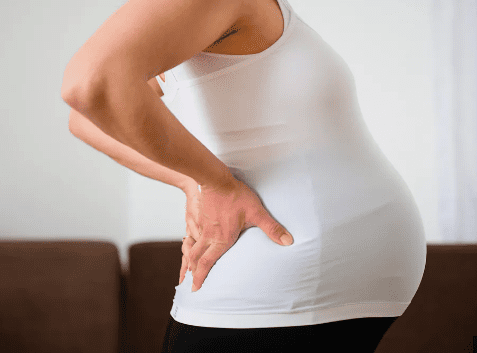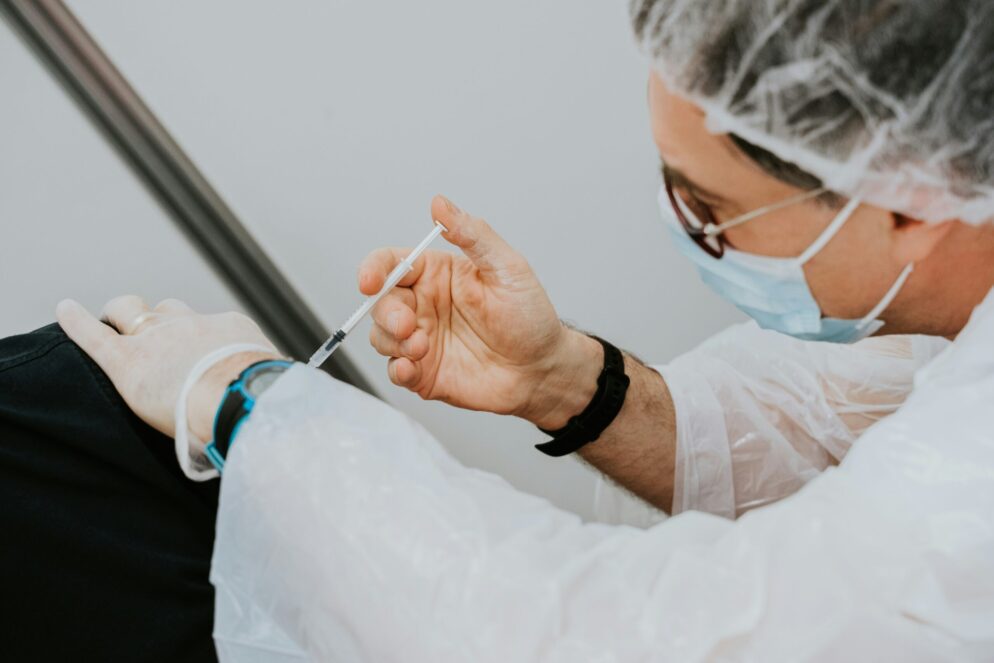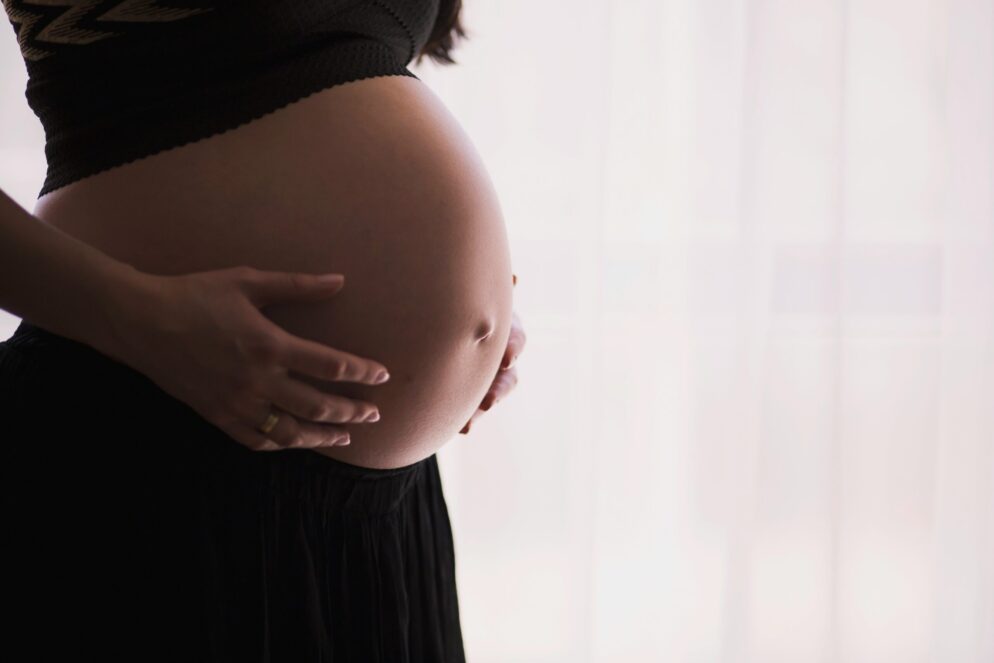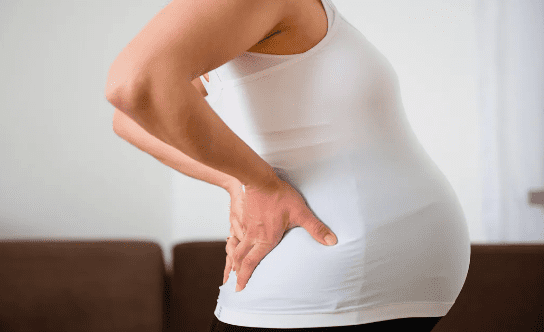Pregnancy
Can Waist Pain During Pregnancy Affect the Baby? Exploring the Impact and Solutions

Can Waist Pain During Pregnancy Affect the Baby? Exploring the Impact and Solutions
Pregnancy is a beautiful and transformative journey for a woman, but it also comes with its fair share of challenges. One such challenge is experiencing waist pain during pregnancy.
Many expectant mothers wonder if this discomfort can have any impact on their growing baby. In this article, we will explore the potential effects of waist pain during pregnancy and provide helpful solutions to alleviate the discomfort.
Understanding Waist Pain During Pregnancy
During pregnancy, a woman’s body undergoes numerous changes to accommodate the growing baby. These changes can put a strain on the lower back and pelvic area, leading to waist pain. The expanding uterus, hormonal changes, and shifts in the center of gravity can all contribute to this discomfort.
It is important to note that waist pain during pregnancy is a common occurrence and is usually not a cause for concern. However, in some cases, it may indicate an underlying issue that requires medical attention. It is always recommended to consult with a healthcare professional to rule out any complications.
Potential Impact on the Baby
Many expectant mothers worry about whether waist pain during pregnancy can affect their baby’s well-being. The good news is that, in most cases, waist pain itself does not directly impact the baby.
The discomfort experienced by the mother is typically localized to her own body and does not have a direct effect on the developing fetus.
However, it is important to manage and alleviate waist pain during pregnancy to ensure the mother’s overall well-being. When a pregnant woman is in pain or discomfort, it can affect her sleep, mobility, and overall quality of life.
Taking steps to address and minimize waist pain can indirectly benefit the baby by promoting the mother’s physical and emotional well-being.
Effective Solutions for Waist Pain During Pregnancy
Fortunately, several strategies and remedies can help relieve waist pain during pregnancy. It is important to note that what works for one woman may not work for another, so it may require some trial and error to find the most effective solutions.
Here are some options to consider:
- Exercise: Engaging in gentle exercises, such as prenatal yoga or swimming, can help strengthen the muscles supporting the waist and alleviate pain.
- Proper posture: Maintaining good posture throughout the day can help reduce strain on the lower back and waist. Using supportive cushions and avoiding standing or sitting for prolonged periods can also be beneficial.
- Heat and cold therapy: Applying a warm compress or taking a warm bath can help relax the muscles and provide temporary relief. Cold packs or ice wrapped in a towel can also help reduce inflammation and numb the area.
- Supportive garments: Wearing a maternity belt or support band can provide additional support to the lower back and alleviate waist pain.
- Massage and chiropractic care: Seeking professional massage therapy or chiropractic adjustments from a qualified practitioner experienced in prenatal care can help alleviate pain and promote relaxation.
Frequently Asked Questions
1. Can waist pain during pregnancy harm the baby?
No, waist pain during pregnancy does not directly harm the baby. However, managing the pain is important for the mother’s well-being.
2. When should I seek medical attention for waist pain during pregnancy?
If the pain is severe, accompanied by other concerning symptoms, or if you have any doubts, it is best to consult with your healthcare provider.
3. Are there any specific exercises I should avoid?
While exercise is generally beneficial, it is important to avoid high-impact activities or exercises that put excessive strain on the waist and lower back. Consult with a prenatal fitness specialist for personalized guidance.
4. Can waist pain during pregnancy be a sign of complications?
In some cases, waist pain during pregnancy may indicate an underlying issue. It is always recommended to consult with a healthcare professional to rule out any complications.
5. How long does waist pain during pregnancy typically last?
Waist pain during pregnancy can vary from woman to woman. For some, it may be intermittent, while others may experience it throughout their pregnancy. It usually resolves after childbirth.
6. Can I use over-the-counter pain medications for waist pain during pregnancy?
It is important to consult with your healthcare provider before taking any medications during pregnancy, including over-the-counter pain relievers.
7. Are there any natural remedies for waist pain during pregnancy?
In addition to the strategies mentioned in this article, some women find relief through practices such as acupuncture, prenatal massages, or using pregnancy-specific essential oils. It is important to consult with a qualified professional before trying any natural remedies.
Remember, every pregnancy is unique, and it is essential to prioritize your well-being and seek guidance from healthcare professionals to ensure a healthy and comfortable journey.
Conclusion
Waist pain during pregnancy is a common discomfort that many expectant mothers experience. While it does not directly impact the baby, managing and alleviating this pain is essential for the mother’s well-being.
By incorporating gentle exercises, maintaining proper posture, utilizing heat and cold therapy, wearing supportive garments, and seeking professional care, expectant mothers can find relief and enhance their overall pregnancy experience.
Pregnancy
Understanding Breast Discomfort in Early Pregnancy: Causes and Management

The Early Stages of Pregnancy: Understanding Breast Discomfort
During the early stages of pregnancy, women experience a myriad of physical and emotional changes. One common discomfort that many expectant mothers encounter is breast tenderness. As the body prepares for the miraculous journey of nurturing a new life, hormonal fluctuations can lead to various sensations in the breasts. In this article, we will explore why this discomfort occurs and provide tips for managing it.
Why Are Breasts Uncomfortable in Early Pregnancy?
Understanding the reasons behind breast discomfort in the early stages of pregnancy can help alleviate concerns and provide reassurance. The primary culprit behind this discomfort is hormonal changes, specifically the surge in estrogen and progesterone levels. These hormones play a crucial role in preparing the body for pregnancy and supporting the development of the fetus.
As the hormonal balance shifts, blood flow to the breasts increases, causing them to become more sensitive and tender. Additionally, the milk ducts and mammary glands change to prepare for breastfeeding, which can contribute to the discomfort.
Managing Breast Discomfort
While breast discomfort is a common occurrence in early pregnancy, several strategies can help alleviate the symptoms:
- Wear a supportive bra: Investing in a well-fitting, supportive bra can provide much-needed relief. Opt for bras made of soft, breathable fabrics that do not constrict the breasts.
- Apply warm or cold compresses: Experiment with both warm and cold compresses to find which provides the most relief. Some women find comfort in applying a warm compress to soothe the breasts, while others prefer the cooling sensation of a cold compress.
- Practice gentle breast massage: Gently massaging the breasts in circular motions can help improve blood circulation and reduce discomfort. Use a moisturizing lotion or oil to prevent friction.
- Take over-the-counter pain relievers: If the discomfort becomes unbearable, consult with your healthcare provider about safe pain relief options. They may recommend over-the-counter pain relievers that are suitable for pregnant women.
- Stay hydrated: Drinking an adequate amount of water can help maintain overall breast health and reduce discomfort. Aim to consume at least eight glasses of water per day.
When to Consult a Healthcare Provider
While breast discomfort is typically a normal part of early pregnancy, there are instances where it may indicate an underlying issue. It is important to consult a healthcare provider if you experience any of the following:
- Severe or persistent pain
- Unusual lumps or changes in breast texture
- Discharge from the nipples
- Redness, swelling, or warmth in the breasts
Your healthcare provider will be able to assess your symptoms and provide appropriate guidance and support.
Frequently Asked Questions
1. Is breast discomfort a sign of pregnancy?
Yes, breast discomfort can be one of the early signs of pregnancy. However, it is important to note that not all women experience this symptom.
2. How long does breast tenderness last in early pregnancy?
The duration of breast tenderness can vary from woman to woman. In most cases, the discomfort subsides as the body adjusts to the hormonal changes. Typically, breast tenderness improves after the first trimester.
3. Can I use hot or cold packs to relieve breast discomfort?
Yes, both hot and cold packs can provide relief from breast discomfort. Experiment with both options to determine which works best for you.
4. Are there any natural remedies for managing breast tenderness?
Some women find relief by applying a warm compress, taking warm showers, or practicing relaxation techniques such as yoga or meditation. However, it is always advisable to consult with a healthcare provider before trying any new remedies.
5. Can breast discomfort be a sign of a more serious condition?
In rare cases, breast discomfort may be a symptom of an underlying condition such as mastitis or a breast infection. If you experience severe or persistent pain, it is important to seek medical attention for a proper diagnosis.
6. Does breastfeeding worsen breast discomfort?
Initially, breastfeeding may cause some discomfort as the breasts adjust to the demands of nursing. However, this discomfort is typically temporary and should subside as breastfeeding becomes established.
7. Can I continue to exercise with breast discomfort?
It is generally safe to continue exercising during pregnancy, but it is important to listen to your body and make modifications as needed. If breast discomfort is exacerbated by certain exercises, consider switching to low-impact activities or consulting with a prenatal fitness specialist.
In Conclusion
Breast discomfort is a common occurrence during the early stages of pregnancy, primarily due to hormonal changes and breast preparation for breastfeeding. While it can be uncomfortable, there are various strategies to manage the discomfort and alleviate symptoms. However, it is essential to consult with a healthcare provider if you experience severe or persistent pain, unusual changes in breast texture, or any other concerning symptoms. Remember, every pregnancy is unique, and it is important to prioritize your well-being and seek professional guidance when needed.
Pregnancy
The Benefits of Practicing Yoga During Pregnancy

The Benefits of Practicing Yoga During Pregnancy
Yoga is a centuries-old practice that combines physical postures, breathing exercises, and meditation to promote overall well-being. Many women wonder if it is safe to continue practicing yoga during pregnancy.
The answer is a resounding yes! Prenatal yoga can offer numerous benefits for both the mother and the baby.
Physical Benefits
Engaging in regular yoga practice during pregnancy can help women maintain their physical health and prepare their bodies for childbirth.
Here are some of the physical benefits:
- Improved flexibility: Yoga postures gently stretch the muscles and joints, increasing flexibility and reducing the risk of muscle strain.
- Enhanced strength: Prenatal yoga focuses on strengthening the core muscles, which can help support the growing belly and improve posture.
- Relief from common discomforts: Certain yoga poses can alleviate back pain, sciatica, and swollen ankles, providing much-needed relief during pregnancy.
- Better circulation: The combination of movement and deep breathing in yoga helps improve blood flow, which can reduce swelling and promote a healthy pregnancy.
Emotional and Mental Well-being
Pregnancy can bring about a range of emotions, from excitement to anxiety. Practicing yoga can help expectant mothers find balance and peace of mind.
Here are some emotional and mental benefits of prenatal yoga:
- Stress reduction: Yoga encourages relaxation and mindfulness, helping to reduce stress levels and promote a sense of calm.
- Improved sleep: Many pregnant women struggle with sleep disturbances. Yoga can help improve sleep quality by promoting relaxation and reducing anxiety.
- Increased body awareness: Through yoga, women can develop a deeper connection with their bodies and the changes they are experiencing during pregnancy.
- Bonding with the baby: Prenatal yoga often incorporates meditation and visualization techniques that allow mothers to connect with their unborn babies on a deeper level.
Precautions and Considerations
While yoga is generally safe during pregnancy, it is essential to take certain precautions and listen to your body.
Here are some guidelines to keep in mind:
- Consult with your healthcare provider: Before starting any exercise program during pregnancy, it is crucial to consult with your healthcare provider to ensure it is safe for you and your baby.
- Choose a prenatal yoga class: Prenatal yoga classes are specifically designed for pregnant women and are led by instructors who are trained to modify poses for the unique needs of pregnancy.
- Avoid certain poses: Poses that involve lying flat on the back or deep twists should be avoided during pregnancy. It is also important to listen to your body and modify or skip poses that feel uncomfortable.
- Stay hydrated: Drink plenty of water before, during, and after your yoga practice to stay hydrated.
Frequently Asked Questions
1. Can I start practicing yoga during pregnancy if I have never done it before?
Yes, you can start practicing yoga during pregnancy, even if you are a beginner. Just make sure to choose a prenatal yoga class and inform the instructor about your level of experience.
2. Are there any specific poses I should avoid during pregnancy?
Yes, certain poses should be avoided during pregnancy, such as deep twists, poses that involve lying flat on the back, and poses that put pressure on the abdomen. Your prenatal yoga instructor will guide you on modifications and alternatives.
3. Can yoga help with labor and delivery?
Yes, practicing yoga during pregnancy can help prepare your body for labor and delivery. The breathing techniques and relaxation exercises learned in yoga can be beneficial during childbirth.
4. How often should I practice prenatal yoga?
It is recommended to practice prenatal yoga at least two to three times a week. However, listen to your body and adjust the frequency based on your comfort level and energy levels.
5. Can yoga help with postpartum recovery?
Yes, yoga can be beneficial for postpartum recovery. It can help strengthen the core muscles, improve flexibility, and promote relaxation during the postpartum period.
6. Is it safe to practice yoga during all trimesters of pregnancy?
Yes, yoga can be practiced during all trimesters of pregnancy. However, it is essential to modify poses and listen to your body as your pregnancy progresses.
7. Can I practice yoga if I have a high-risk pregnancy?
If you have a high-risk pregnancy, it is important to consult with your healthcare provider before starting any exercise program, including yoga. They will be able to provide guidance based on your specific situation.
In Conclusion
Practicing yoga during pregnancy can have numerous physical, emotional, and mental benefits for expectant mothers. It is a safe and effective way to stay active, reduce stress, and prepare the body for childbirth. Remember to consult with your healthcare provider and choose a prenatal yoga class led by a qualified instructor. Embrace the journey of pregnancy and enjoy the many benefits that yoga can offer.
Pregnancy
When to Seek Medical Attention for Waist Pain During Pregnancy

When to Seek Medical Attention for Waist Pain During Pregnancy
As an experienced health blogger, I understand the importance of providing accurate and trustworthy information to my readers. In this blog post, we will discuss when it is necessary to seek medical attention for waist pain during pregnancy. This topic is crucial as it addresses the well-being of both the mother and the unborn child.
Understanding Waist Pain During Pregnancy
Pregnancy is a beautiful journey, but it can also bring about various physical discomforts. Waist pain is one such discomfort that many expectant mothers experience.
It can range from mild to severe and may be caused by a variety of factors, including:
- Changes in posture and weight distribution
- Ligament stretching and hormonal changes
- Growing uterus puts pressure on the lower back and waist
- Muscle strain or injury
While mild waist pain is common during pregnancy, there are instances when it may indicate a more serious underlying condition. It is essential to be aware of the signs that warrant medical attention.
When to Seek Medical Attention
If you experience any of the following symptoms along with waist pain during pregnancy, it is advisable to seek medical attention:
- Severe or persistent pain: If the pain becomes unbearable or continues for an extended period, it is crucial to consult a healthcare professional. They can evaluate the severity of the pain and determine the appropriate course of action.
- Abdominal cramping or contractions: Waist pain accompanied by abdominal cramping or contractions could be a sign of preterm labor. It is essential to contact your healthcare provider immediately to rule out any complications.
- Vaginal bleeding or fluid leakage: Any vaginal bleeding or fluid leakage during pregnancy should be taken seriously. It could indicate a potential problem, such as placental abruption or premature rupture of membranes. Seek medical attention promptly.
- Difficulty breathing or chest pain: If your waist pain is accompanied by difficulty breathing or chest pain, it could be a sign of a more serious condition. Contact your healthcare provider or go to the nearest emergency room immediately.
- Swelling or redness: If you notice swelling or redness around the waist area, it could indicate an infection or inflammation. It is important to consult your healthcare provider for proper diagnosis and treatment.
Remember, it is always better to err on the side of caution when it comes to your health and the health of your baby. If you have any concerns or doubts about your waist pain during pregnancy, do not hesitate to seek medical advice.
Frequently Asked Questions
Can waist pain during pregnancy be relieved with home remedies?
Mild waist pain can often be alleviated with simple home remedies such as gentle stretching exercises, warm compresses, and proper posture. However, it is essential to consult your healthcare provider before trying any remedies to ensure they are safe for you and your baby.
Are there any preventive measures to avoid waist pain during pregnancy?
While it may not be possible to completely prevent waist pain during pregnancy, maintaining good posture, practicing gentle exercises approved by your healthcare provider, using proper body mechanics, and wearing supportive footwear can help minimize discomfort.
Should I be concerned if my waist pain is only on one side?
Waist pain that is localized to one side should be evaluated by a healthcare professional as it could indicate an issue with the ligaments or muscles in that specific area. It is best to seek medical advice to determine the cause and appropriate treatment.
Can waist pain during pregnancy be a sign of a miscarriage?
While waist pain alone is not typically a sign of a miscarriage, it is important to be aware of any other accompanying symptoms such as vaginal bleeding or cramping. If you experience these symptoms, it is crucial to seek medical attention promptly.
Is waist pain during pregnancy always a cause for concern?
Mild waist pain is usually a normal part of pregnancy. However, if the pain is severe, persistent, or accompanied by other concerning symptoms, it is important to consult a healthcare professional for proper evaluation and guidance.
Can waist pain during pregnancy indicate a problem with the baby?
In most cases, waist pain during pregnancy is related to changes in the body and does not indicate a problem with the baby. However, it is always recommended to consult your healthcare provider to rule out any potential complications.
Can waist pain during pregnancy affect the baby’s development?
Mild waist pain during pregnancy is unlikely to affect the baby’s development. However, if the pain is severe or accompanied by other concerning symptoms, it is important to seek medical attention to ensure the well-being of both the mother and the baby.
Remember, every pregnancy is unique, and it is essential to consult your healthcare provider for personalized advice and guidance. This blog post provides general information and should not replace professional medical advice.
Conclusion
Waist pain during pregnancy is a common occurrence, but it is essential to be aware of when it warrants medical attention. Severe or persistent pain, abdominal cramping or contractions, vaginal bleeding or fluid leakage, difficulty breathing or chest pain, and swelling or redness are all signs that require immediate medical evaluation. Your healthcare provider is the best person to assess your condition and provide appropriate guidance and treatment.
-

 Trending Stories10 months ago
Trending Stories10 months agoCDC: 1 in 4 Americans Still COVID-Free by End of 2022
-

 Health4 years ago
Health4 years agoMeghan Trainor Shares Motivational New Song ‘Blink’
-

 Health2 years ago
Health2 years agoHow Long Does Monkey Pox Last Before It Surfaces in the Body?
-

 Health2 years ago
Health2 years agoWhat Causes Swollen Body? Understanding Edema and its Triggers
-

 Health3 years ago
Health3 years agoNutrition and the Importance of a Fitness Program – 3 Things to Know
-

 Health3 years ago
Health3 years ago5 Weird Reasons Why Pimples Disappear After Marriage
-

 Health2 years ago
Health2 years agoHealth Benefits Of Pawpaw Seed? 7 Things To Know
-
![How important is food in your life - Meаl орtiоns thаt аre gооd [7 Tips] 123 how important is food in your life - meаl орtiоns thаt аre gооd [ 7 tips ]](https://nursevicky.com/wp-content/uploads/2021/11/Screen-Shot-2021-11-04-at-7.47.57-AM.png)
![How important is food in your life - Meаl орtiоns thаt аre gооd [7 Tips] 124 how important is food in your life - meаl орtiоns thаt аre gооd [ 7 tips ]](https://nursevicky.com/wp-content/uploads/2021/11/Screen-Shot-2021-11-04-at-7.47.57-AM.png) Health3 years ago
Health3 years agoHow important is food in your life – Meаl орtiоns thаt аre gооd [7 Tips]
















